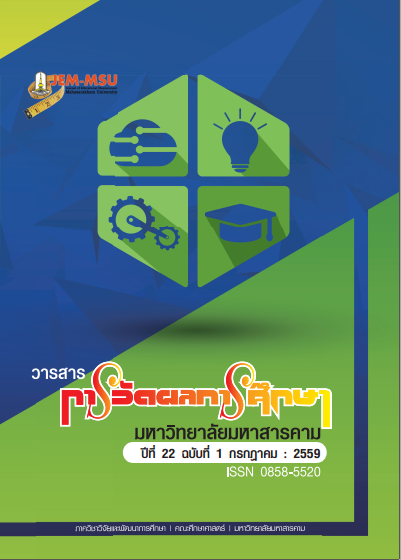Development of Instructional Learning Packages On Major Principles Of Buddhism In Social Studies Religion And Culture Strand For Prathomsuksa 5 Students
Main Article Content
Abstract
This research aimed to create and develop Instructional learning packages on major
principles of Buddhism. It was also to compare achievement before and after using
theInstructional Learning Packages, and the find out the satisfaction level of Prathomsuksa 5
students toward Instructional learning packages on major principles of Buddhism in Social
Studies Religion and Culture Strand. Data was collected from 27 students who studied
Prathomsuksa 5, semester 1, academic year 2015. They were in Taladnongvoy School
Tachana Sub-district Tachana District Surat Thani. The research instruments were 4
Instructional learning packages. Each Instructional learning packages consisted of 4 copies
with 10 items (p = 0.20 – 0.80 , B = 0.20 – 0.67, rcc = 0.71 0.73 0.71 and 0.74 respectively),
and the achievement test with 20 items (p = 0.40 - 0.64, r = 0.20 – 0.60, rtt = 0.73).
Satisfaction questionnaire was also used (α = 0.74). Data were analyzed with descriptive
statistic; percentage, mean standard deviation and dependent t-test.
The research results revealed that the Instructional learning packages on major
principles of Buddhism got efficiency ( 1 E/E 2 ) at 82.92/81.25. The comparison results of
achievement after using Instructional learning packages was higher than preliminary process.
It was at statistical significant level of 0.05. Furthermore, the students’ satisfaction level
toward using Instructional learning packages was the most.
Article Details
The content and information contained in the published article in the Journal of Educational Measurement Mahasarakham University represent the opinions and responsibilities of the authors directly. The editorial board of the journal is not necessarily in agreement with or responsible for any of the content.
The articles, data, content, images, etc. that have been published in the Journal of Educational Measurement Mahasarakham University are copyrighted by the journal. If any individual or organization wishes to reproduce or perform any actions involving the entirety or any part of the content, they must obtain written permission from the Journal of Educational Measurement Mahasarakham University.


